Thoughtworks
0 opportunities
Australia
101-1,000 employees
Maria Baturina
Consultant Developer
We caught up with Consultant Developer, Maria Baturina to chat about her journey into the tech industry, and her experience starting out as a Thoughtworks graduate developer.
Hi! I’m Maria. I joined ThoughtWorks as a graduate developer in May 2021 and I am now a developer consultant. I started between Covid lockdowns and was lucky to spend some time in the office to meet my colleagues in person straight away.
Did you have any prior coding experience?
Yes and no. I came from overseas to pursue my master’s degree in data science, and prior to that I completed my bachelor’s degree in economics in my home country. So at the time my coding experience was limited to university assignments and a few internships I did while studying my master’s in data science.
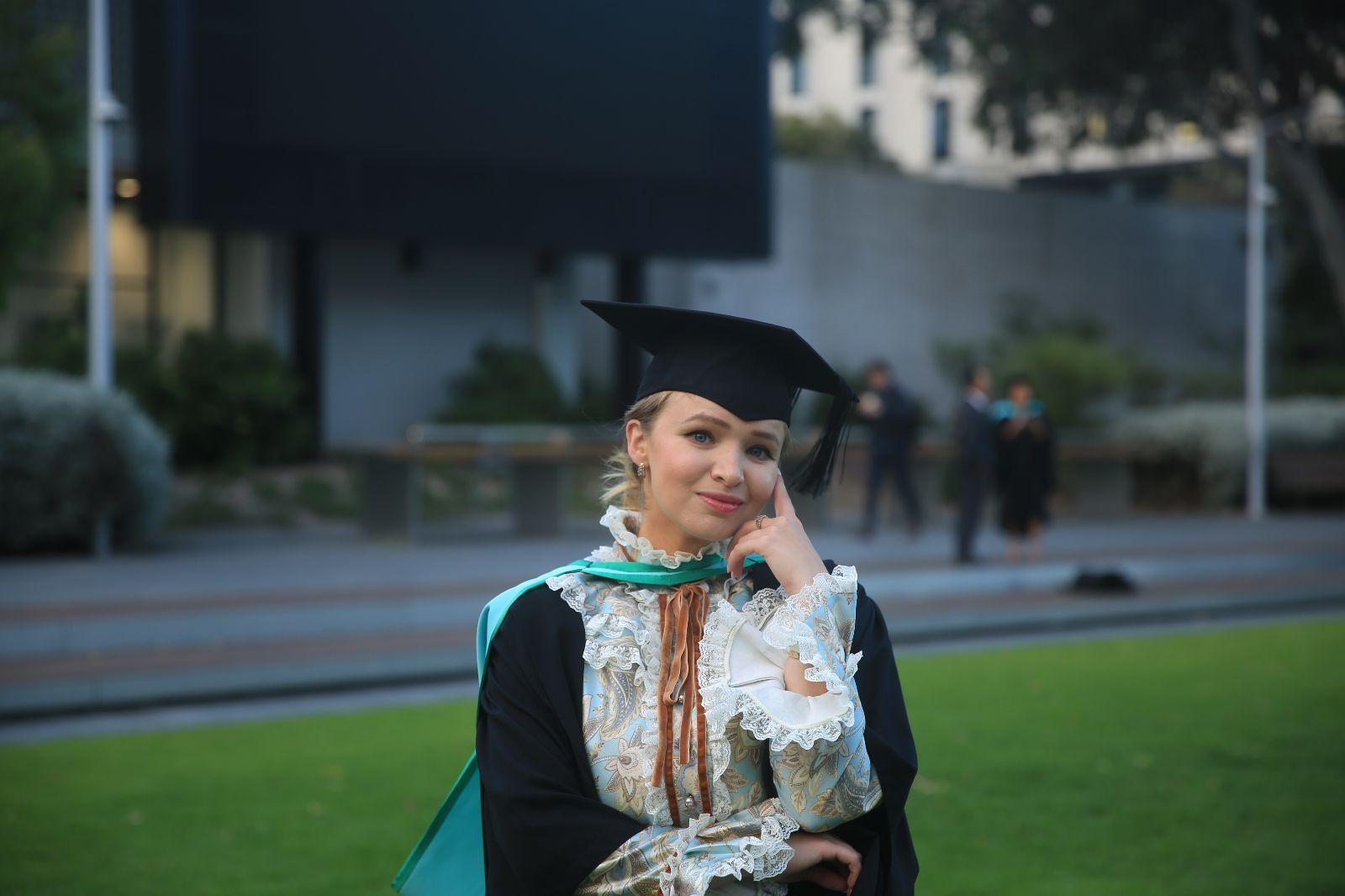
How did your recruitment process happen?
The Thoughtworks interview process is pretty thorough.. I had an initial conversation with the recruiter, then there was a quiz, a cultural interview, a pairing interview and a presentation interview. Throughout the many stages, it all went very smoothly. I was very happy to get the job offer. I still remember how it happened — I was grocery shopping when I got the call from my recruiter. As I was hearing the news I went quiet for a few seconds and then just started jumping around as soon as it hit me that I got the job!. Keep in mind that I was still at the store, so people were looking at me.
Tell us about your Thoughtworks University (TWU) experience
I think I joined TWU two weeks after starting. I was excited and anxious at the same time. TWU taught me so many things tech-wise, but it wasn't just tech that I learned. In class, we were taught how to function as a team, not just as an individual. We learned agile principles and best practices. Also, how to adapt and overcome challenges quickly.
As I have mentioned before, I studied a master's in data science and had no prior coding knowledge. My technical skills were in Python, R and SQL while the TWU experience was built around Javascript and Java — two languages in which I had zero experience. The first two weeks were the hardest for me. I felt so behind everyone that I started thinking they made a mistake hiring me. Eventually I was able to get a hold of the new languages and lessons because the team and tutors were so kind and helpful. Nothing is impossible even if you doubt yourself, there will be people who believe in you and will support you. That is one of the biggest lessons in my life.
I’ve realized that what I experienced during the first two weeks at TWU was imposter syndrome. Almost everyone I know has gone through the experience of thinking “Oh, I am not as good as they are”. Even now, I still think those thoughts sometimes, but I have learned to recognize it and use it to my benefit instead.
By the way, here are some of us finally meeting in person.
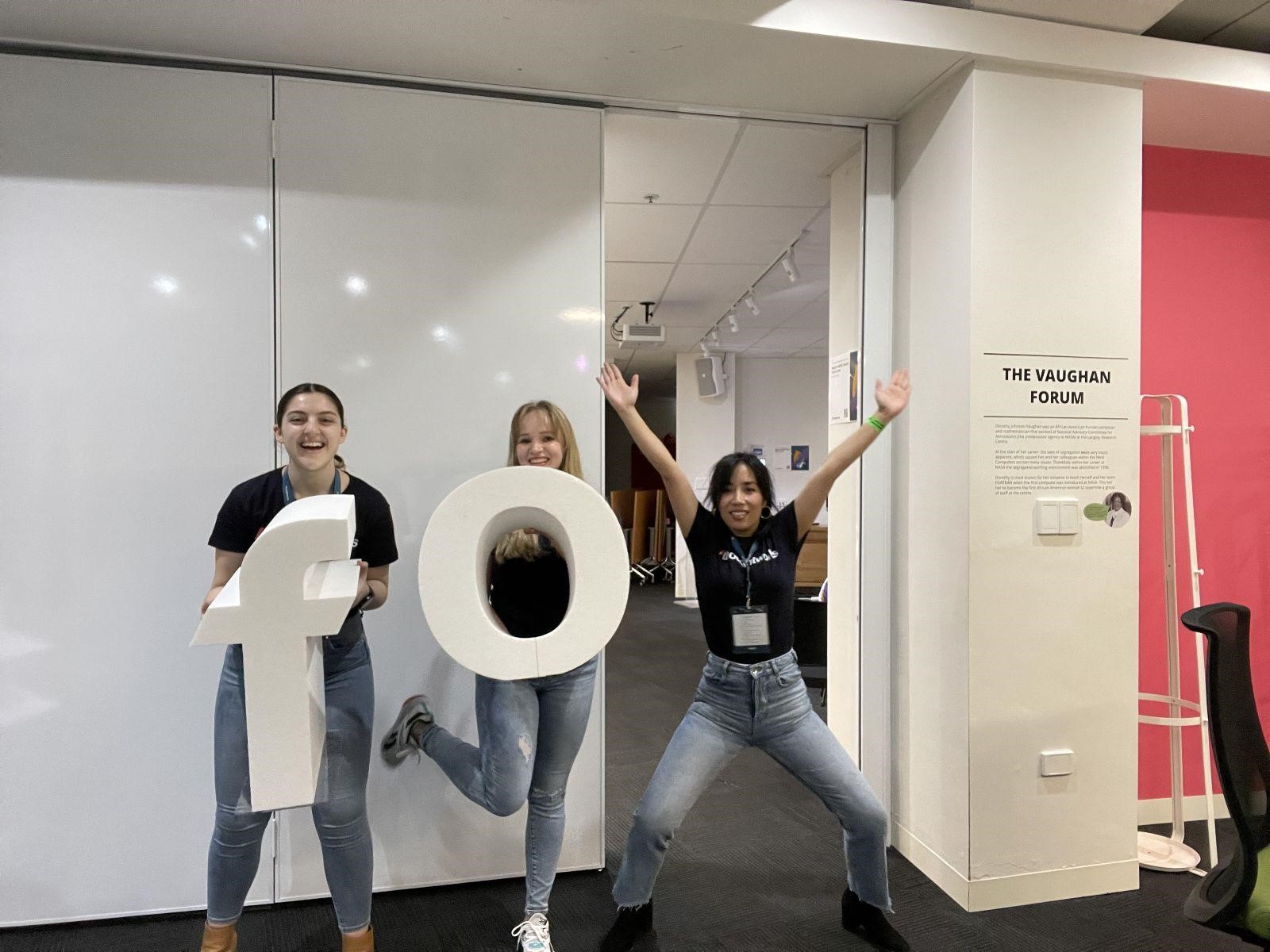
What did you do after TWU?
I joined a client project a few days after finishing TWU. It was such an amazing and fruitful experience! I met a lot of intelligent and supportive people, we all learned from each other. Our team and the client team did their best to make the project a safe space for me and others on their first client project. Now we were actually dealing with real life problems and delivering real life solutions. It took me some time to learn about the nature of the project. I had to explore and understand the non-technical side of it. I was on the project for six months, and another shortly after. I have also worked on a few internal projects.
How did you adapt to remote working?
It was not hard. Half of my degree was online because of Covid, so I was used to it. To this day I enjoy working from home even though our office is open. It took me some time to figure out how to improve my WFH environment to fit my needs the best way possible. I found out that physical activity gives me a lot of energy for the day and also keeps me focused. Knowing this, I got myself a walking pad which is under my standing desk.
What are your tips for any graduate starting their career?
Familiarize yourself with imposter syndrome. The sooner you know about it, the easier it will be for you to move past it and accept that you don’t always have to know it all. Instead focus on your strengths, and don't forget to work on your weaknesses as well. Start by focusing on one thing or breaking up a big task into smaller steps, rather than taking on everything at once.
Best of luck on your journey!
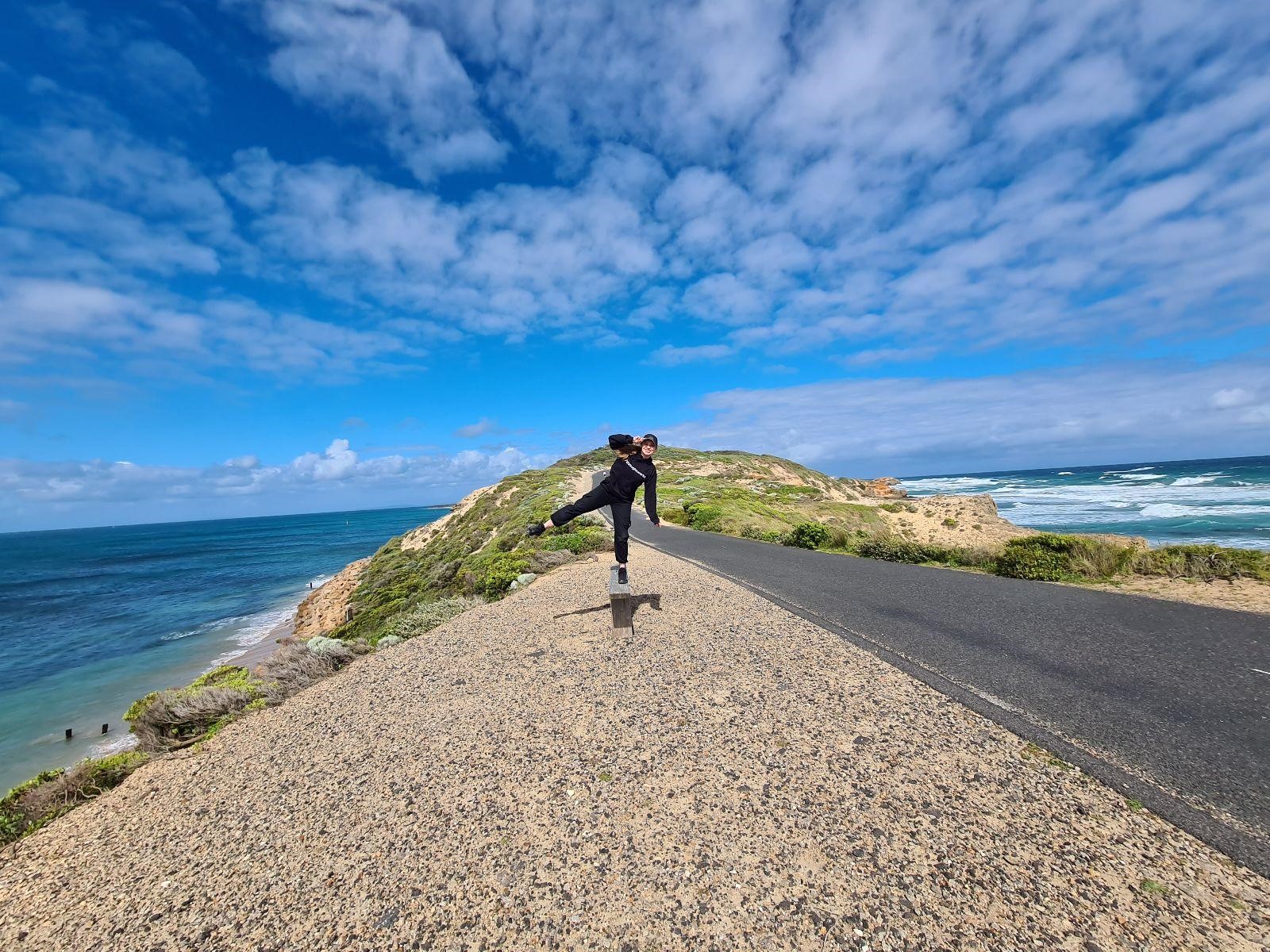
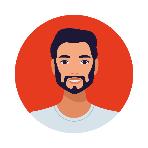
Tripti Ramesh
Business Analyst (BA)
We caught up with Business Analyst (BA), Tripti Ramesh to discuss her journey into the tech industry, what it was like starting out as a Thoughtworks graduate and the career paths as a BA.
How did you become a business analyst?
I stumbled upon a few electives at university that were on agile software development which opened up a whole new world of software practices. Coming from an engineering background, I had to learn how I could use my soft skills to blend into an IT role. My first few jobs in marketing and sales helped me gain the confidence and ability to think from a user’s perspective. With the help of some LinkedIn courses and an internship in a software delivery project, I was able to gather more knowledge on real-world practices and challenges. Through this experience, I learnt that to play a business analyst role I need to have good communication skills to be able to understand the product requirements and translate it in a manner that developers could then implement. Business analysts should also pay attention to detail, identify the right questions and escalate when we are not working towards meeting our goal.
Thoughtworks interview process
I applied via a LinkedIn job ad and received a call to attend an interview. This was during Covid so the entire interview process was on Zoom. In the first round I was introduced to the job role and expectations. One of the best things at that time was the option to work from home. Now flexible work is part of the culture at Thoughtworks. The second round was a home assignment and the next round was a technical interview. My final round was the cultural interview. What worked for me throughout the interview process was being authentic and expressing a desire to learn more.
My Thoughtworks University experience
My journey as a grad business analyst at Thoughtworks started with joining Thoughtworks University. At the time of Covid, this was fully remote and it was the first project experience where I had the chance to learn what agile software delivery entails. Coming from a start-up background, I was used to doing a lot of upfront analysis and was familiar with the disconnect between what is planned and what actually happens. During my Thoughtworks University tenure, I got to unlearn traditional development methods and learn the agile way of doing things. We had the opportunity to connect with other grads across the APAC region and work on a simulated client project. This introduced us to Thoughtworks culture while learning to manage client expectations by interacting with a product owner. Throughout our TWU experience we had many learning sessions with trainers who shared their knowledge on different topics. In our respective teams we would then apply what we learnt to our project. Our learning was very hands-on and we got to practice along the way. By the end of it, I was prepared to confidently join real engagements. I had the resources and I could always rely on my team if I faced any challenges.
MYOB Grad Program
My first actual client experience was on the MYOB grad program. This was a unique collaboration between Thoughtworks and MYOB where the graduates from both companies had the opportunity to collaborate and work on a real project to drive business value with the support of senior stakeholders and mentors. The team was a mix of graduate developers, senior developers, senior business analysts / project managers and/or quality analysts alongside my role as graduate business analyst. We worked on a project right from the concept phase. Starting with an inception to define what our goals were, what success looked like, the scope, RAIDs (risks, assumptions, issues, and dependencies), trade-offs, customer journey mapping, story mapping, etc. This helped us to start the work of executing our product vision. At this stage we are still working through the details but we knew the high-level user requirements, priorities and the time it would take to produce a minimum viable product with our tech stack.
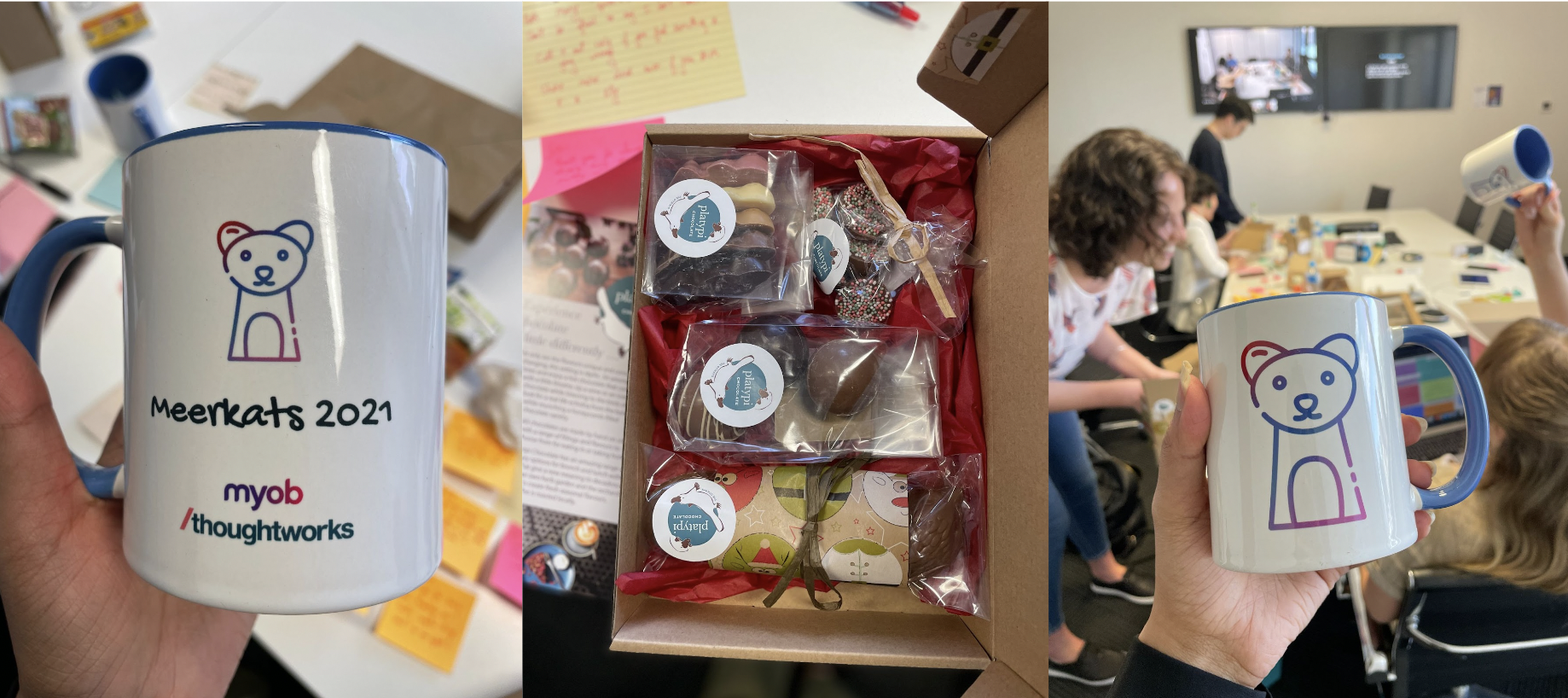
MYOB Grad Program catch-up
My typical day
On a typical day I would start with a stand-up and run through my activities for the day. This is followed by a business analyst huddle where I pair with my mentor, a senior business analyst, and write stories, set up prioritization with the client or facilitate team workshops to find a solution. Our regular cadence is to run sprint ceremonies, wrap up the sprint with a showcase and RAIDs log, and then move on to planning for the next sprint. During this time, I learnt important tips and tricks from my mentor to help grow my skills as a business analyst .
What do you love the most about your job?
I get to work with awesome people who are great at everything they do. We are assigned in teams and rely on each other for feedback and growth. Overall, it’s a team effort to deliver the best possible solution that meets the goals we are working to achieve with the client. As a business analyst I enjoy the planning phase where we learn about our customers and write stories — at times pairing with experience designers . I’ve been part of a few different engagements, and I have learnt that there are many different shapes a business analyst can take. The most important role for us is to ensure we have understood client requirements and are in a position to help the team in setting up a regular cadence with necessary planning. Some engagements require deep analysis on a particular problem area or a high-level plan that spans across many teams.
What are the career prospects for your job?
There are a few paths a consultant business analyst can take in their journey. From product focused roles, such as a product manager or project management ie. project manager or iteration manager, to an experience designer role. As business analysts, we work closely with experience designers to design the product features. I have also discovered that there is scope for specialization as a business analyst in a few areas such as data and artificial intelligence or in domain specific fields. Thoughtworks opens up unique opportunities to train and get experience in specialist areas. As an example, I’ve had a chance to wear the quality analyst hat to support what the team needed at the time and have been able to learn and grow into that role.
Which three pieces of advice would you give to a current university student?
- Look out for internship opportunities during your time at university — having practical experience is a bonus
- Develop your transferable skills, it could be from experiences like organizing events at university or trying out new courses
- Keep an open mind, work in as many diverse groups as possible and show enthusiasm to learn and try new things
What do you love the most about your job?
I get to work with awesome people who are great at everything they do. We are assigned in teams and rely on each other for feedback and growth. Overall, it’s a team effort to deliver the best possible solution that meets the goals we are working to achieve with the client. As a business analyst I enjoy the planning phase where we learn about our customers and write stories — at times pairing with experience designers . I’ve been part of a few different engagements, and I have learnt that there are many different shapes a business analyst can take. The most important role for us is to ensure we have understood client requirements and are in a position to help the team in setting up a regular cadence with necessary planning. Some engagements require deep analysis on a particular problem area or a high-level plan that spans across many teams.
What are the career prospects for your job?
There are a few paths a consultant business analyst can take in their journey. From product focused roles, such as a product manager or project management ie. project manager or iteration manager, to an experience designer role. As business analysts, we work closely with experience designers to design the product features. I have also discovered that there is scope for specialization as a business analyst in a few areas such as data and artificial intelligence or in domain specific fields. Thoughtworks opens up unique opportunities to train and get experience in specialist areas. As an example, I’ve had a chance to wear the quality analyst hat to support what the team needed at the time and have been able to learn and grow into that role.
Which three pieces of advice would you give to a current university student?
- Look out for internship opportunities during your time at university — having practical experience is a bonus
- Develop your transferable skills, it could be from experiences like organizing events at university or trying out new courses
- Keep an open mind, work in as many diverse groups as possible and show enthusiasm to learn and try new things

Shuai Wang
Business Analyst
We caught up with Business Analyst, Shuai Wang to discuss his journey into the tech industry, and what it was like starting out as a Thoughtworks graduate
How did you become a business analyst?
I studied Master of Information Systems at university and business analyst (BA) was one of the roles that aligned with this major. Compared with other roles, becoming a business analyst has allowed me to work on things that I’m passionate about, which is helping people solve problems through the delivery of valuable and usable software. After graduating from university, I completed a three month internship working as a business analyst for an Australian company, where I got the chance to perform some BA related tasks and was inspired to progress further in this role.
Why did you want to join Thoughtworks?
When I was in university I had a classmate who was working at Thoughtworks and he shared many good things about his work experience. It was during this time I learned that Thoughtworks is one of the pioneers in advocating agile practices. Reading about the extraordinary impact they have created with clients and within society resonated with me. I was so impressed with the extremely supportive culture and great diversity that I wanted to become a Thoughtworker after graduation
The recruitment process
After submitting my application, I received a call from the recruiter for the initial phone interview and a subsequent video interview was then scheduled. The video interview was for the recruiter to get to know me and answer any questions I had. The second round was a take-home assignment, followed by a technical interview focusing on the key BA skills. The last round was the cultural interview. My recruiter was super professional and friendly. She coordinated the overall recruitment process very well and patiently answered the questions I had. I’m grateful and lucky to have had such a smooth and well organized recruitment process.
Tell us about your Thoughtworks University (TWU) experience
When you join Thoughtworks as a graduate you’re invited to participate in TWU to further develop core skills that prepare you for success in your career. TWU consists of both the learning and practical sessions. In the learning sessions, trainers talk about the best delivery practices and share knowledge on key skills required. The practical sessions provide graduates with the opportunity to apply what they have learned to simulations of client engagement projects so they can experience what a BA would do in real life. TWU graduates from different countries and regions are assigned to different cross-functional teams. The teams have two trainers who patiently provide coaching to help graduates maximize their learning and facilitate team bonding. As a BA, I was a super fan of TWU. It gave me hands-on experience in agile delivery and I was able to practice and develop many BA related skills such as story writing, backlog management and workshop facilitation.
The MYOB grad program
Upon completing TWU, I joined the MYOB grad program - a co-sourced graduate development program between MYOB and Thoughtworks. In this engagement I was part of a cross-functional team largely composed of graduates and career changers. One of the goals of this engagement was to accelerate the growth of graduates, with each graduate assigned a mentor to pair with fordaily work. I was assigned a very senior BA from Thoughtworks and we worked together on all kinds of BA-related work for six months. Being able to closely work with her is probably one of the best things in my career so far. It gave me so many opportunities to observe how a senior BA analyzes the requirements and performs key tasks. She encouraged me to perform similar tasks with her guidance which created a safe learning environment.
Pairing with an experienced BA greatly sped up the process of demystifying what a BA does every day and what their key duties include. As a result, my core BA skills have greatly improved and I’ve started to formulate my own ways of working in this role.
Besides learning from my mentor, I spent a lot of time pairing with another graduate BA which was also super beneficial. When pairing (also with the guidance of a senior BA), we discussed the priorities of our work, planned our day-to-day, prepared workshops and meetings together, supported each other and further exchanged our lessons learned — including ideas on how to improve oneself.
Just like other real engagements, it’s paramount to deliver value to the client alongside mentoring and learning. My team was very supportive. Everyone was encouraged to express their opinions freely and to help each other. I enjoyed collaborating with the team during our daily stand up, Three Amigos meeting (involves a BA, developer and quality analyst), estimation and retro sessions. Our great team culture and strong collaboration laid a solid foundation for the success of the project and we delivered a valuable product to the client
How did you adapt to remote working?
I didn’t find it hard to adapt to remote working. Since joining Thoughtworks remote working has been prevalent both internally and externally with our clients. TWU was also fully remote because of the pandemic and this got me used to it. Now that the restrictions are lifted and I can connect with the team in person. I usually go to the office as needed or when my work or meetings would benefit from face-to-face.
Can you describe a typical workday?
Based on my experience, a typical workday for a BA varies greatly depending on the nature of an engagement. For a product delivery engagement, my workday usually starts with a daily stand up where everyone on the team shares an update, what their plans for the day look like and any blockers. The blockers may be discussed briefly with the whole team so that we can help each other.
A BA will perform any or all of the following tasks (below is not a exhaustive list):
- Requirements analysis
- Story writing
- Prioritization
- Backlog grooming
- Story kick-off
- Desk check
- Three Amigos meeting and estimation
- Communicating with the product owner
- Workshop facilitation
- Iteration planning meetings
- Showcase
- Retro
- Ad hoc work such as sending emails to stakeholders
Which three pieces of advice would you give to a current university student?
- Be positive and resilient: Life is full of challenges but never give up when it gets hard — staying positive will help you navigate the challenges and realize your dream
- Get some work experience: Apply for internships on roles that interest you and validate whether the work excites you — by doing this you’ll have had a taste of the role and a better understanding of what you’re passionate about
- Connect with people working in the industry: This will give you a clear and current understanding of what’s happening in the industry, including what skills are required for the role that interests you and help focus your efforts on the most important skills and in-demand areas that will kick start your career

